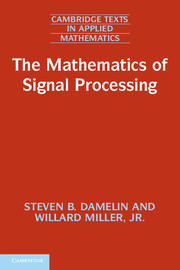Book contents
- Frontmatter
- Contents
- Preface
- Introduction
- 1 Normed vector spaces
- 2 Analytic tools
- 3 Fourier series
- 4 The Fourier transform
- 5 Compressive sampling
- 6 Discrete transforms
- 7 Linear filters
- 8 Windowed Fourier and continuous wavelet transforms. Frames
- 9 Multiresolution analysis
- 10 Discrete wavelet theory
- 11 Biorthogonal filters and wavelets
- 12 Parsimonious representation of data
- References
- Index
8 - Windowed Fourier and continuous wavelet transforms. Frames
Published online by Cambridge University Press: 05 June 2012
- Frontmatter
- Contents
- Preface
- Introduction
- 1 Normed vector spaces
- 2 Analytic tools
- 3 Fourier series
- 4 The Fourier transform
- 5 Compressive sampling
- 6 Discrete transforms
- 7 Linear filters
- 8 Windowed Fourier and continuous wavelet transforms. Frames
- 9 Multiresolution analysis
- 10 Discrete wavelet theory
- 11 Biorthogonal filters and wavelets
- 12 Parsimonious representation of data
- References
- Index
Summary
In this chapter we study two different procedures for the analysis of time-dependent signals, locally in both frequency and time. These methods preceded the general discrete wavelet method and we shall see how they led to discrete wavelets. The first procedure, the “windowed Fourier transform” is associated with classical Fourier analysis while the second, is associated with scaling concepts related to discrete wavelets. Both of these procedures yield information about a time signal f(t) that is overcomplete. To understand this it is useful to return to our basic paradigm y = Φx where x is a signal, Φ is a sample matrix and y is the sample vector. Our problem is to recover the signal x from the samples y. In this chapter x = f(t) and Φ is an integral operator. However, for the moment let us consider the finite-dimensional case where x is an n-tuple, Φis an m × n matrix and y is an m-tuple. If m = n and Φ is invertible then we can obtain a unique solution x = Φ-1y. In the case of compressive sampling, however, m < n and the problem is underdetermined. It is no longer possible to obtain x from y in general, without special assumptions on x and Φ. Now suppose m > n. The problem is now overdetermined. In this case one can always find m-tuples y for which there is no x such that y = Φx.
- Type
- Chapter
- Information
- The Mathematics of Signal Processing , pp. 242 - 271Publisher: Cambridge University PressPrint publication year: 2011

